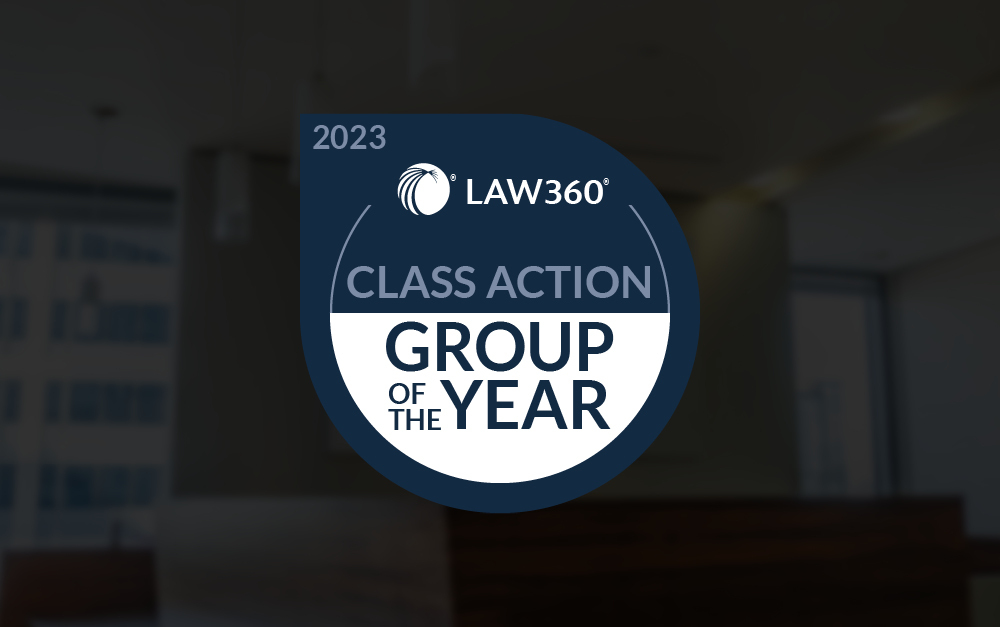Class Action Group Of The Year: Robbins Geller

By Rae Ann Varona
Law360
Article is reprinted with permission from Law360.
Law360 (February 2, 2024, 3:28 PM EST) -- Robbins Geller Rudman & Dowd LLP is behind numerous high-impact class action deals, including a record-breaking $1 billion settlement for minority shareholders who accused Dell Technologies Inc. of shortchanging them in a controversial $23.9 billion stock swap, earning the firm a spot among Law360’s 2023 Class Action Groups of the Year.
The securities class action settlement — which received final approval in April — marked the peak of a dispute initiated by a class suit of minority investors who accused Dell, private equity firm Silver Lake Group, and others of breaching their fiduciary duties and shortchanging shareholders by roughly $10.7 billion in a deal that exchanged Class V stock for Class C stock they alleged was overvalued. The Class V stock was meant to track Dell’s stake in cloud computing company VMWare Inc.
The deal ended up being the largest recovery reached before judgment in a fiduciary duty action in Delaware’s Chancery Court, with Vice Chancellor J. Travis Laster — citing 4½ years of litigation and more than 53,000 attorney hours racked up before a hearing on the approval — describing the settlement as a “huge effort.”
According to Robbins Geller, the deal also set a high bar for Fortune 500 companies eyeing mergers or stock swaps. More than 66% of Fortune 500 companies are governed by the court, according to the state.
“It was understood throughout the bar that that was going to be a very difficult case from the word go,” Chad Johnson, partner in the firm’s Manhattan office, said.
Johnson, a former deputy attorney general for New York, said a big challenge was making sure the defendants understood that the firm was not only willing but ready to take the case to trial.
That, Robbins Geller did, when it secured the deal less than a month before trial was supposed to start.
Johnson credited the success to the firm’s “ethos of mutual support.” He said the firm truly operates as one in that it’s not internally competitive and, importantly, gets resources to cases that need them.
He said that in the Dell case, for example, a lot of work came out of the New York City office, but the firm also tapped into other offices when needed.
With the help of co-counsel, Johnson said the firm was able to not only take the case to the brink of trial but ultimately send a message to Wall Street and the rest of corporate America that they couldn’t cheat minority shareholders and not expect to be held accountable.
Johnson said it also helps that he and his colleagues get to work with some of the “smartest and most creative” lawyers on the plaintiff’s side.
“You bounce thoughts off of others, and you only get sharper and sharper ideas,” he said.
The firm’s ability to seamlessly work as one found success with big wins over the past year not only in securities, but in antitrust and consumer rights.
In March, the firm helped to get the Second Circuit to uphold a historic $5.6 billion credit card interchange fee deal against Visa and Mastercard — a settlement that involved nearly 18 years of litigation and is believed to be the largest-ever antitrust class action settlement in history.
In the months after, it helped secure favorable resolutions on consumer rights when getting Walgreens and management consulting giant McKinsey & Co. to pay out hundreds of millions of dollars for their roles in the opioid crisis.
Walgreens, in May, agreed to pay $230 million to San Francisco in a multidistrict litigation bellwether, following a long bench trial against it, Allergan and its parent AbbVie, and Teva Pharmaceuticals.
While the latter three companies settled with the city before closing arguments, Walgreens hung on all the way to the verdict, after which U.S. District Judge Charles R. Breyer handed down an over 100-page decision, holding that evidence during trial established the company breached its duty to make sure drugs weren't being diverted and harming the public.
In September, McKinsey also agreed to pay $230 million to settle claims that it was behind false and misleading marketing strategies Purdue Pharma LP and other pharmaceutical companies used to boost opioid sales while roughly 350,000 people in the U.S. died from an opioid overdose between 1999 and 2016.
Like Johnson, Darren Robbins, a founding partner of the firm, said the firm’s ability to strategically dedicate resources to all cases it takes on played a role in its success.
“I think that’s what separates us — the breadth of our human and financial resources, which we bring to bear on behalf of pension funds and sovereign wealth funds around the world,” Robbins said, adding that the firm’s strategies have allowed it to go toe-to-toe with some of the best defense firms in the country, and often with many of them at once.
But Robbins also praised the firm’s breadth of experience and its unwillingness to compromise its clients’ interests, even in long-running cases like the one involving Visa and Mastercard.
Aelish Baig, a partner at Robbins Geller’s San Francisco office who served as co-trial counsel in the Walgreens case and was appointed to the plaintiffs’ steering committee in the McKinsey case, similarly credited the firm’s “tenacity and endurance.”
Whether it be in securities, antitrust or consumer rights, Baig said such steadfastness has ultimately gotten the firm ready to face many of the most topical issues in the country.
“Being at the forefront of that is very exciting and having the resources to go toe-to-toe with the largest corporations in the country is fun and rewarding,” she said.
--Editing by Janice Carter Brown.
All Content © 2003-2024, Portfolio Media, Inc.
To view the original article, click here.
Read More Awards
- November 24, 2025
- July 21, 2025
- July 2, 2025
- June 19, 2025
- March 24, 2025